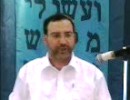- Sections
- Bemare Habazak - Rabbis Questions
- Family and Society
- The Jewish Household
21
Answer: The minhag of a Shalom Zachar is mentioned by a couple of Rishonim and may have a source in the gemara. The gemara (Bava Kama 80a) mentions an Amora going to a shavua haben or yeshua haben. While Rashi relates this to a pidyon haben, Tosafot cites an opinion that it was to celebrate the birth of the baby, who was safely extricated from his mother’s womb. The Terumat Hadeshen (I:269) connects it to the minhag that existed in his time and ours, to have a celebration with food on the night of the baby’s first full Shabbat. (The Orchot Chayim (Mila) says something similar.) The Rama (Yoreh Deah 265:12) cites this minhag as standard, and it is so for Ashkenazim to this day. (Sephardim have a similar observance the night before the brit called a Brit Yitzchak, and some Ashkenazim also do a practice called "vach nacht" that night). The question of whether it is better for the nuclear family to do it alone or for grandparents to have one with greater participation is a good one.
Several explanations are given for Shalom Zachar, and, at first glance, they influence the answer to your question. The Terumat Hadeshen (ibid.) relates it to celebration of the birth, which should include thanks to Hashem, which makes it a seudat mitzva. Anyone who feels connected can thank Hashem for that, but parents most so.

Bemare Habazak - Rabbis Questions (596)
Rabbi Daniel Mann
559 - Ask the Rabbi: Scratching Improperly Parked Cars
560 - Ask the Rabbi: Anonymous Return of Stolen Money
561 - Ask the Rabbi: Not Taking Vacation Time on Chol Hamo’ed
Load More
The Derisha (YD 264:2) says that at the Shalom Zachar, we console the baby for the loss of the Torah he studied in his mother’s womb (based on Nida 30b). This could lead to the conclusion that the baby must be at the Shalom Zachar to be consoled (Teshuvot V’hanhagot II:202). The fact that it is often done even without the baby can be attributed to the other reasons (ibid.). Furthermore, even the consoling does not have practical impact (not meaning to insult the baby’s intellect), but is spiritual or perhaps symbolic. So it is possible that "consolation" can be gained when people gather in the baby’s honor and bless him in abstentia.
Is the participation of people outside the nuclear family important? Many sources (including the early ones) refer to people coming. Considering there is no ceremony and the food served is minor (see Aruch Hashulchan, OC 265:37), the visitation is apparently central to the event (see explanations in Osin B’simcha, Ma’amar 4).
Considering the above, it is fully appropriate for you to make a Shalom Zachar. This does not exclude the parents doing something low-key at the hospital, and they can "turn it into" a Shalom Zachar by eating traditional Shalom Zachar foods (e.g., chickpeas, almonds), thanking Hashem for the birth, and discussing the upcoming brit’s significance.
We are reluctant to pressure those dealing with the work that a new birth brings to quickly arrange multiple events. We understand that it may not always be feasible to do a "real Shalom Zachar" (it need not be extensive or fancy). However, a child’s birth is MAJOR in Judaism, and, when possible, the baby and Hashem deserve due regard according to our holy minhagim.

Ask the Rabbi: Fundamental Questions about Lifnei Iver
Rabbi Daniel Mann | Shevat 5785

Ask the Rabbi: Watching a Bar Mitzva Videoed on Shabbat
Rabbi Daniel Mann | Adar 5785

Ask the Rabbi: Owning Guns
Rabbi Daniel Mann | Adar 5785

A Litigant’s Behavior Before
Various Rabbis | 5774

That a Cohen May Not Marry a Divorcee
Rabbi Shmuel Holshtein | 5769

Is papaya a tree?
Rabbi Yirmiyohu Kaganoff | Shvat 2 5779

Olive Oil Concerns
Rabbi Yirmiyohu Kaganoff | 5771
Uniting Intellect and Emotion in the Beit HaMikdash and Religious Zionism
Ein Aya Shabat Chapter B Paragraph 40 (p1)
Rabbi Ari Shvat | Tishrei 25 5775
Daf Yomi Makkot Daf 19
R' Eli Stefansky | 29 Nisan 5785
Daf Yomi Makkot Daf 21
R' Eli Stefansky | 1 Iyar 5785

Parashat Hashavua: More Mila than Brit?
Rabbi Yossef Carmel | Iyar 5785







